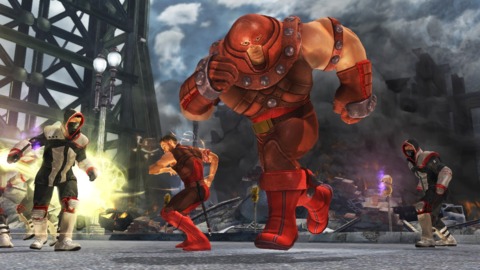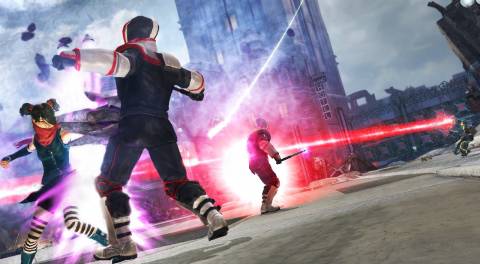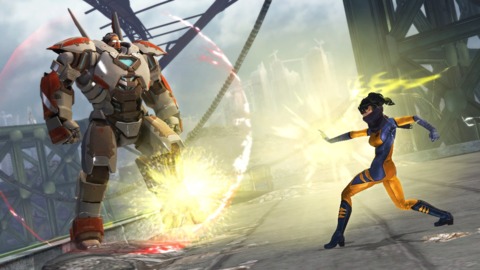
For comic book fans, there’s really no shortage of listless, mercenary dreck like X-Men: Destiny. There’s an overwhelming sense that contractual obligation trumped whatever ambitions Silicon Knights--a developer of checkered consistency--might’ve had for this action RPG centered on cultivating your own mutant persona. Although, with the way player-controlled customization and progression has methodically crept into just about every genre of game, calling X-Men: Destiny an action RPG is probably granting far too much importance to its barely noteworthy role-playing element. This is, more essentially, a beat-’em-up game of limited dimension, populated with repetitious enemy fodder and driven by monotonous three-tap combat where the notion of player agency couldn’t seem more superfluous. That it was developed by Silicon Knights, and then quietly swept onto store shelves with little fanfare by publisher Activision, are probably the most noteworthy facts about this otherwise disposable experience.
As someone who, over the past decade, has had most of my exposure to the X-Men through avenues other than the actual comics, X-Men: Destiny opens bewilderingly enough. An entire game’s worth of fiction is blown through before you even pick your character, with massive events like inexplicable, global natural disasters, the death of Professor X at the hands of supervillain Bastion, the subsequent disbanding of the X-Men, their reformation in San Francisco, and the rise of an apocalyptic anti-mutant hate group known as the Purifiers being skimmed over in a minute or two. It’s an overload of information delivered in a careless, over-compressed cinematic sequence that seems to assume you already knew all this anyway. The story continues on this way, tossing around third-string X-Men and springing clandestine plot twists with little explanation. Not that these machinations of the X-Men, the Brotherhood of Mutants, the MRD, the U-Men, Bastion, or the Purifiers are of much consequence. Regardless of where the story leads, "go here, punch all these guys” is the only meaningful directive in X-Men: Destiny.

Also of little consequence is the whole character creation system. Superficially, you can choose to play as one of three, freshly minted young mutants with disparate personalities and backstories, sculpting them into the mutant of your dreams armed with a melange of trademarked mutant abilities, while striking an alliance with either the X-Men or the Brotherhood of Mutants. Beyond simple aesthetics, fostering a sense of consequence and allowing the player to approach the game with different abilities are two of the fundamentals of role-playing in video games, and X-Men: Destiny unilaterally fumbles both.
While the character customization system lets you earn and cultivate a whole host of active and passive powers, many of your choices are redundant, and none of the wildest deviations have that fundamental an impact on how the game is played. Whether you choose the energy blasts, density modulation, or shadow blades abilities, and whether you choose to align yourself with the X-Men or the Brotherhood, you’ll still be tapping out the same basic combos against the same crowds of gas-masked thugs while being funneled down the same deserted streets and generic facilities.
Even on the game’s highest difficulty, enemies are cut down thoughtlessly, to the point that hastily introduced subsystems like lock-on targeting and blocking prove needless. The side benefit of the easily dispatched foes is that you never stop moving forward, though in a game that can be easily beat in less than five hours, with no meaningful reason to play through a second time, maybe that's not so much of a benefit.

While the X-Men have invited a variety of distinct stylistic takes over the years, Silicon Knights chose to go with “awkward cosplayer” in X-Men: Destiny, with all three player-character choices feeling particularly like Brand-X-Men. The environments are small, bland, and generic, and on a personal note, I find it irksome when a game chooses a specific, real-world locale like San Francisco, and then proceeds to spend the majority of the time in nondescript corridors, as X-Men: Destiny does. A lumpy art style is done no favors by the technology behind it, which struggles regularly with frame rate. It’s telling when the frame rate drops to single digits in a prerendered cutscene, as it does in one occasion here.
Top to bottom, this game feels rushed, a supposition backed up by Silicon Knights’ history of protracted development cycles, from which X-Men: Destiny did not benefit. While politics of why that’s the case, as well as speculation on the impact more time and money would’ve had on the game, are ultimately irrelevant to the game’s failures as they are, it’s not that hard to see how it could’ve been something great.